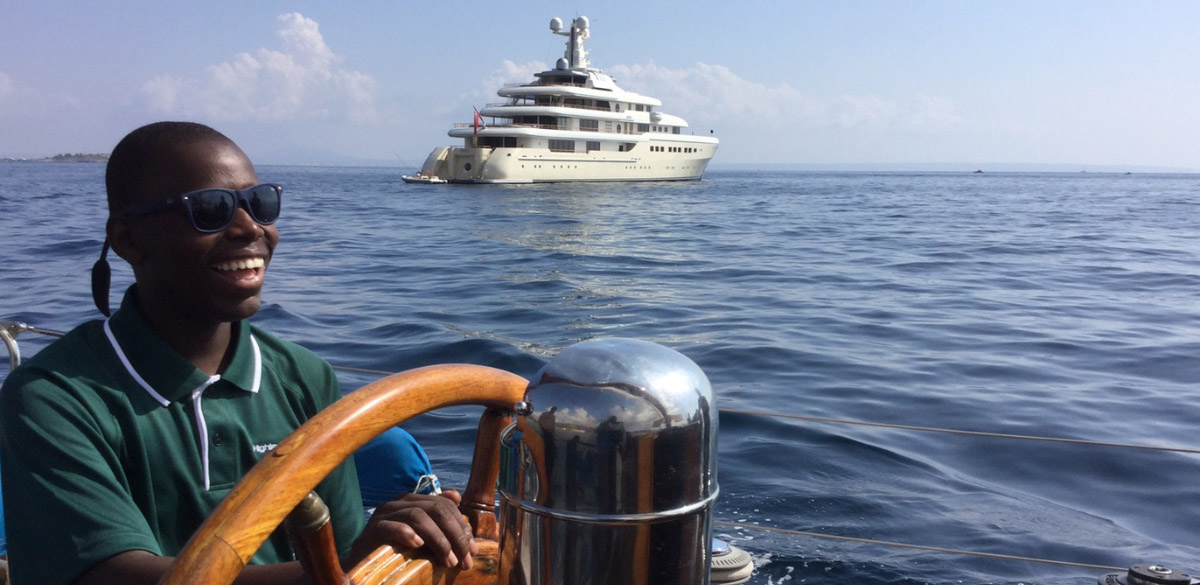Partner and manager of two marinas in Mallorca for 15 years Oscar has been designer and consultant for marina projects in various countries, and designer of customized marina elements. He has shared his experience through more than 30 conferences in 12 countries and has written numerous articles for Marina World and other international nautical magazines. Oscar is a Certified Marina Professional, was founder director of the Global Marina Institute, member of ICOMIA’s Marinas Committee, member of PIANC Recreational Marine Committee, Convenor of ISO TC228 WG8 “Yacht Harbours”, member of the Global Marine Business Advisers (GMBA) group and founding member of the Asia Pacific Superyacht Association.
In life and in yachting, learning the lessons of your mistakes is all part of the journey. And those of us who’ve been there and done it must not shy away from giving the next generation enough rope to berth the boat – trusting that they won’t decorate the propellers with it…
I have the training blues. That’s the only way I can describe it, it is the closest description I have found. There are many groups, societies and well-meaning people that make it possible for trainees to attend workshops or join the crew onboard to learn the reality of the nautical career they may be considering.
But how do we ensure these well-meant intentions are as conducive to education as they should be, and that our time invested as educators is as productive for our candidtates as they require?
I will draw on the example of Phil Wade who, of oversized heart and legendary yachting fame, has organised for some nine years now along with one of his friends, for unprivileged South African children to learn about yachting and assit them on their path towards becoming qualified yacht crew or yachting technicians. With charity, Marine Inspirations, Phil was inspired to “give back to the industry”, and they have since trained male and female young adults and children in the ways of the water, opening the door of possibility for a promising career in the yachting industry. The young students are given theoretical training in South Africa and the ones who better assimilate to the course are taken on a two-week trip to Palma to assist with regattas, visit shipyards and yacht support companies, and sometimes do some sailing, too. Other pupils are placed as apprentices aboard yachts or gain experience with marine industry companies operating on shore.
So far so good. This organised and recognised NGO can evidence wonderful results and many successful cases where these youngsters have become an established part of the yachting community, youungsters who otherwise may have suffered the traditional limitations of opportunity and finding quality employment. It’s a beautiful story, but there is a blockage in the way of their further development: the on-the-job training. Of course, someone without experience must start with the basic chores of the trade, but that must include taking on more responsibilities and being allowed to make mistakes, which are indelible learning experiences. Assigning higher levels of (surveyed) decision-making is the next step, and letting them fail and learn from it is a necessary part of the process.
Too many managers accepting trainees opt to keep them away from decisions or operational machinery, afraid they could make a dangerous mistake. That does not help them in their quest for experience; it is the job of management to manage the risk of the mistakes that a trainee can make and trust the student to take appropriate action if things go wrong.
When I had trainee deckhands on yachts, seeking to get their officer’s ticket, of course I wouldn’t be off to my cabin at night letting them take a night watch alone, but I would stay close to the bridge to check on things now and again, and be ready to react should help be called for. The watch is theirs, the final responsibility is mine.
The fear of something going wrong is with us as the trainers, and only serves to express our insecurity. Our knowledge and experience should give us the peace of mind to see a trainee as another variable in the system, one to be monitored but not limited to the new tasks being learned, remembering that making your own mistakes is the best experience.
Novel doctors must practice after graduating under (but not limited by) a seasoned doctor’s supervision before they can practice alone. The method is used in many disciplines, but it doesn’t work if the trainees cannot perform under real conditions. In helicopter pilot training, you are sent to fly solo after just 30 hours with an instructor. The aerospace industry is highly conscious of safety, but the apparently dangerous learning protocol works! Those two situations can be far more dangerous than mistaking a distant fishing boat’s lights for shore-based ones, wrongly tying down a mooring line or pinpointing a plot in the chart that’s a few miles off.
Trainees with special abilities will excel in handling their assigned job situations, and be identified early in their career as promising industry professionals. These examples can be extrapolated to each and all duties in our nautical (and other) professional worlds. Let us eliminate our fears and give our young followers the opportunities they deserve.





























0 Comments